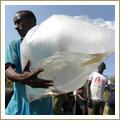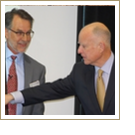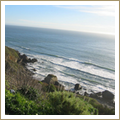 |
View this newsletter in your browser. |
 |
| Research Highlights | |
| People Spotlights | |
| Program Updates | |
| In the News |
Helping Ideas Become SolutionsGreat ideas need friends. Since 2004, the Stanford Woods Institute has awarded $8.5 million in Environmental Venture Projects (EVP) seed grants to 56 interdisciplinary research teams working in 24 countries. These projects have led to innovative environmental solutions such as natural resources valuation software and biodegradable building materials. They have garnered more than $39 million in follow-on funding and have involved faculty from all of Stanford's seven schools. We look forward to seeing what this year's winners achieve. Read on to learn more about the 2013 EVPs and other exciting news. Sincerely, |
||
Debbie Drake Dunne |
Jeffrey R. Koseff |
Barton H. Thompson, Jr. |

Environmental Venture Projects AwardedA breakthrough for measuring marine animal populations, a natural approach to curbing parasitic infections and a new method for evaluating bridge vulnerability. These transformative initiatives are among the Environmental Venture Projects announced this week by the Stanford Woods Institute. The annual grants are awarded for interdisciplinary research aimed at finding practical solutions to major environmental and sustainability challenges. Here are the 2013 Environmental Venture Projects. Principal investigators are in bold.
Photo credit: Susanne Sokolow |

Evolution Shapes New Rules for Ant BehaviorIn ancient Greece, city-states that waited until their own harvest was in before attacking and destroying rival communities' crops often experienced better long-term success. It turns out that ant colonies that show similar selectivity when gathering food yield a similar result. The latest findings from a decades-long study by Stanford Woods Institute-affiliated biology Professor Deborah M. Gordon provide the first evidence of natural selection shaping collective behavior. |
| For more research, see the Stanford Woods Institute quarterly Research Digest. |

Scientific Consensus Reaches LeadersRecently, California Gov. Jerry Brown has been circulating a document to leaders including Chinese President Xi Jinping and U.S. Secretary of State John Kerry. The document, an environmental consensus statement whose drafters include seven Stanford Woods Institute senior fellows, lays out a global scientific consensus and offers broad-brush solutions for challenges including climate change, loss of eco-diversity, extinctions, pollution, population growth and overconsumption of resources. More than 500 scientists from around the world, including two Nobel laureates, have signed the statement so far. Anthony Barnosky, a University of California at Berkeley integrative biology professor and Cox Visiting Professor in Stanford's Department of Environmental Earth Systems Science, and Woods Senior Fellow Elizabeth Hadly (Biology) led the effort to draft the statement. |

Preparing for Sea Level Rise, Boosting California's EconomyThe California public overwhelmingly supports preparing now for the impacts of global warming and believes, more so than the general U.S. public, that state government should take significant steps to lessen the consequences of sea level rise. Woods Senior Lecturer Meg Caldwell (Law) presented these and other findings in recent testimony before the California State Assembly Select Committee on Sea Level Rise and the California Economy (watch video from 1:54). For her testimony, Caldwell, executive director of the Center for Ocean Solutions (COS), cited a recent poll commissioned by Woods and COS. Photo credit: Kglavin |

'Emerging Explorer' Uses Technology to Combat Illegal FishingNational Geographic named Stanford alumnus Shah Selbe an Emerging Explorer for his work on a technology that combats illegal, unreported and unregulated (IUU) fishing. During a graduate study program with the Center for Ocean Solutions, Selbe developed FishNET, a web-based system that relies on crowd-sourcing, drone technology and satellites to monitor and report IUU fishing, especially in regions that lack sufficient monitoring and enforcement resources. FishNET captures and analyzes data on fishing vessels and exploited areas. It promises to drastically improve the ability to manage human impact on oceans, shape effective ocean policy and maintain food security. |

New Software Promotes Nature's Delivery of Clean WaterFreshwater is one of the planet's most scarce resources. Demand for it is growing, and climate change threatens its supply. A new, free open-source software tool developed by researchers from the Natural Capital Project at the Stanford Woods Institute could be part of the solution. The Resource Investment Optimization System (RIOS) incorporates local knowledge and preferences to help guide cost-effective investments in nature for clean and reliable water. It has been field tested throughout Latin America and could prove useful anywhere in the world. Photo credit: The Nature Conservancy |

Sanitation Solution Gets Kudos From InnovatorsA sanitation project that received seed funding from Woods' Mel Lane Student Grants Program recently earned praise from some of the world's foremost experts in innovation. A panel of judges representing NASA, Silicon Valley companies and Bay Area universities, among other institutions, named re.source as the best "Best Overall Solution" in the Showcase of Solutions for Planetary Sustainability at the Sustainable Silicon Valley Water, Energy and Smart Technology Summit. The initiative deploys portable, affordable dry household toilets in the developing world. It is now being field-tested in Haiti. Stanford civil and environmental engineering Ph.D. students Sebastien Tilmans and Kory Russel co-founded re.source under the guidance of Woods Senior Fellow Jenna Davis (civil and environmental engineering), faculty lead for Woods' Water, Health and Development program. |

A Green and Blue Revolution in Africa?Food and water security in sub-Saharan Africa remain elusive despite the region's abundance of arable land and untapped water resources. In the final symposium of a two-year series on global food policy and food security hosted by the Center on Food Security and the Environment, water expert John Briscoe drew upon his many years of international field experience (including a 20-year career at the World Bank) to assess Africa's situation and suggest ways forward. Among Briscoe's suggestions: Africa could learn from the example of middle-income countries such as Brazil that have tapped agriculture and development potential through investments in infrastructure and agricultural productivity. |

The Future of Smart EnergyHow is the U.S. Marine Corps changing the way it uses energy on the battlefield? What role can nanotechnology play in making computing more energy-efficient? Attendees of the Energy & Environment Affiliates Program (EEAP) spring conference explored these and a range of other far-reaching energy efficiency and smart energy issues. Speakers such as Tom Steyer, co-founding director of clean-energy advocacy group Next Generation, and Guangyi Liu, director and chief engineer for China Electric Power Research Institute's Smart Grid Operation Research Center, addressed aspects of modern and intelligent energy usage with application to specific industries. |
| Selected media coverage of the Stanford Woods Institute and its fellows, affiliated scholars and supported research |
Using 'Nature as an Asset' to Balance Costa Rica's Farming With PreservationPBS, June 10 |
Turning Sharks and Seals Into ScientistsPopular Mechanics, May 30 |
Bridging the Science-to-Society GapNature.com, May 24 |
A Plan to Bring Sun-Powered Irrigation to Poor Farmers The New York Times, May 20 |
Strong Coral in American Samoa Thrives in Warm SeaRadio Australia, May 17 |
Stanford Scientists Develop Underwater Labs to Study Coral and Climate ChangeThe Peninsula Press, May 15 |
The Coming GOP Civil War Over Climate ChangeGrist, May 12 |
| Find Us on the Web |
Read more News and Media Coverage from the Stanford Woods Institute's fellows and affiliated faculty, including fellows with our Leopold Leadership Program. Submissions The Stanford Woods Institute for the Environment online newsletter is published each month except for July/August and December/January, when issues are combined. Past issues can be found online. For more information about the Stanford Woods Institute, visit our website, or email us at environment@stanford.edu. |